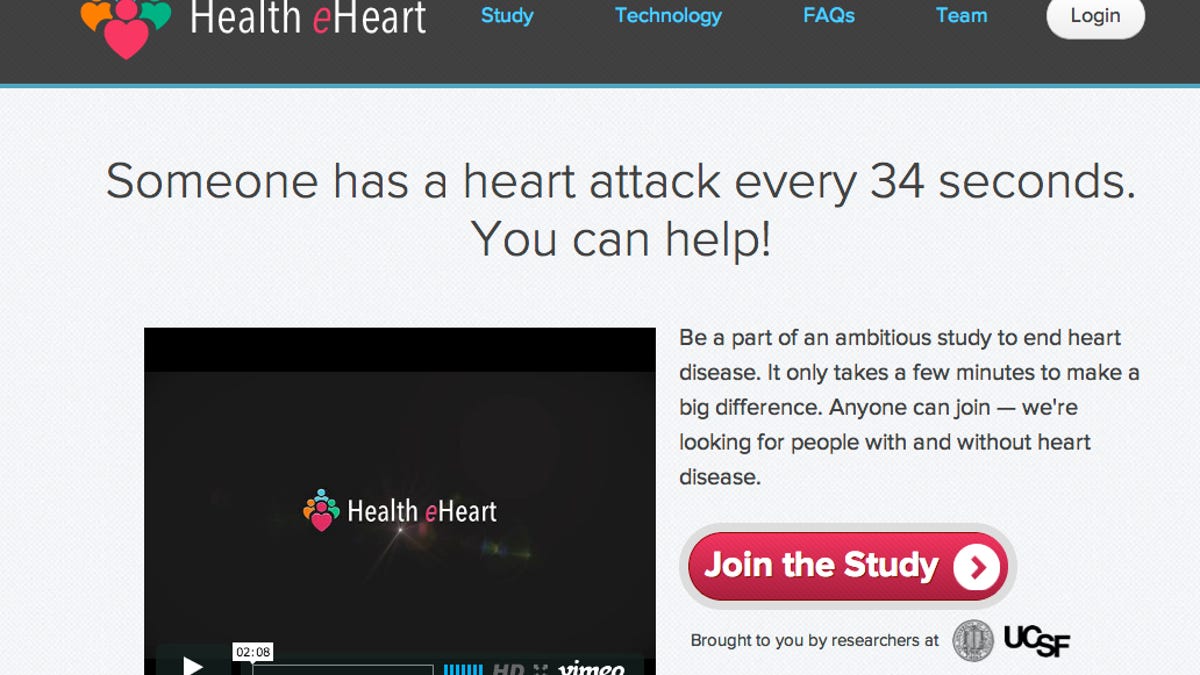Heart study uses mobile tech to try to enroll 1M participants
Physicians at the University of California at San Francisco hope their Health eHeart Study, launched this week, will help them develop new ways to predict and prevent heart disease.

If researchers at the University of California at San Francisco have their way, their new heart disease study won't suffer from a small sample size. Using online and mobile phone tools, they hope to get 1 million people from around the world to participate.
Launched this week, their Health eHeart Study (yes, very cute) enables participants to use their smartphones to frequently monitor heart rate, blood pressure, and pulse rate, and submit the resulting data via a secure online portal. The researchers, in turn, will use fancy algorithms to crunch that massive volume of data.
The goal? To use the super sample size to better understand -- and thus predict and prevent -- heart disease.
"We hope to be able to collect copious amounts of data on a large segment of the population so we can develop very robust and accurate models to predict the occurrence of heart disease in people who don't yet have heart disease, or slow the progression in people who already have heart disease," cardiac electrophysiologist Jeffrey Olgin, chief of the UCSF Division of Cardiology and lead researcher on the study, said in a school news release. "And because these patients are connected to us electronically and through their smartphones, we can deploy the study very quickly."
Heart disease claims the lives of 600,000 Americans a year, more than those who die from all types of cancer and AIDS combined, according to the Centers for Disease Control and Prevention. Someone has a heart attack every 34 seconds, and someone dies from one every minute. With 82 million Americans (that's one in three adults) living with heart disease, it costs the U.S. almost $110 billion a year in health services, medications, and of course, lost productivity.
"Most people aren't aware that one out of four deaths in America is due to heart disease," Olgin said. "And a third of people who have cardiovascular disease aren't even aware of their risks. That's why the 'Health eHeart Study' is so important."
The study builds off the groundbreaking Framingham Heart Study, which for years tracked 5,209 men and women in Framingham, Mass. That's not a bad sample size for a study that launched in 1948, before smartphones, apps, the Internet, and even desktop computers eased the management of large scientific studies.
The Framingham study followed three generations of participants ages 30 to 62, both with and without symptoms of heart disease. It led to several major findings that today seem so obvious: Smoking cigarettes is linked to a higher risk of heart disease; high blood pressure increases the risk of stroke; obesity is a risk factor in heart disease; and higher levels of HDL cholesterol reduce the risk of death.
Today, with half of mobile phone users owning smartphones in the U.S. alone, the framework of the Framingham study was in need of an upgrade. The Health eHeart study offers free apps, social media, and biannual "eVisits" to help participants more easily stay in touch with the researchers, and even makes wearable sensors freely available to certain participants to collect data on blood pressure, heart rate, ECG, activity, sleep, arrhythmia, and more.
Interested in participating? The study's Web site has a simple registration process that involves entering a user name, email address, password, and date of birth. You'll have to fill out an online consent form, but from there you can complete basic surveys as well as opt in to specific ones that may interest or apply to you. The researchers are asking that participants -- who by the way can have no known cardiovascular disease risks -- participate for at least 10 years.

